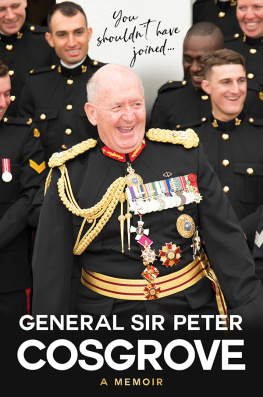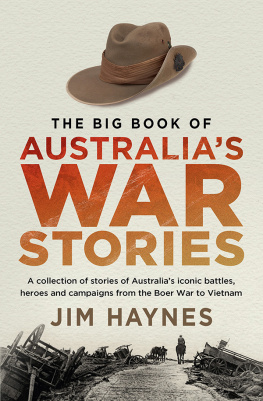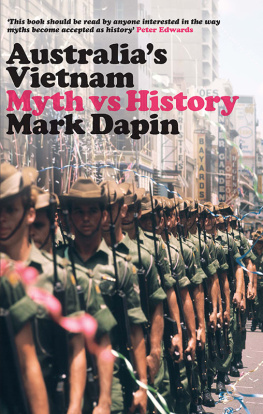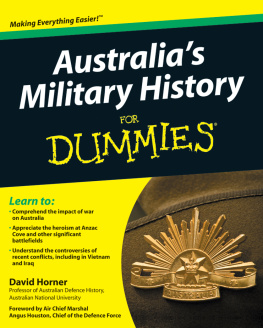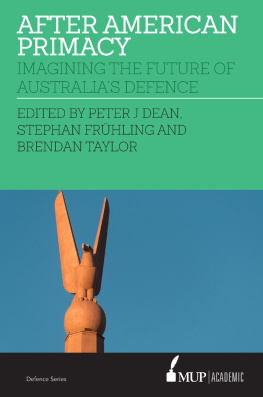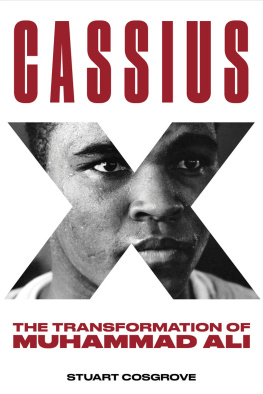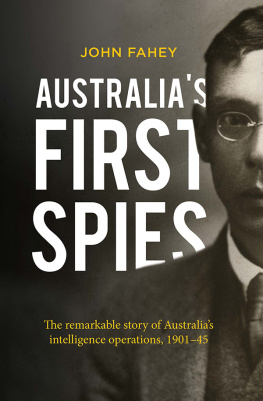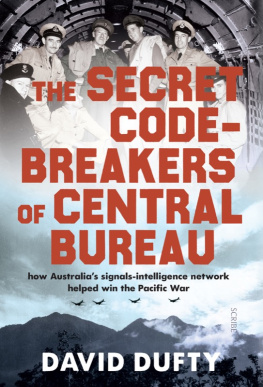
Back in 2005 my working world, the one that I had loved and embraced for more than forty years, came to an end. In the middle of that year I retired from the Australian Army, from the glare of public life, and from the accountability and privilege of high command. I had only vague notions of what might lie ahead but was content with, indeed amazed at, what lay behind. Swirling around in my mind were notions of Lynne and I establishing ourselves back in our home town, Sydney, of me being a more attentive and available husband and father and (hopefully) grandfather. Lynne, in the most loving way, reminded me that when we married it was for better or worse but, she added, not for lunch, which seemed to rule out moping about the house. I had an inkling that I might end up with some invitations to join various boards of management in the commercial world, but I further ruled out anything that looked like full-time employment.
One thing that did occur to me then was the notion of writing. If you want to immerse yourself in formulaic writing, then look no further than writing in the Australian public service (with some notable exceptions) or in the Australian Defence Force (with no notable exceptions whatsoever). This is not to say that the writing style within these institutions is not crisp and informative, focusing always on information rather than emotion. But what I had in mind was to pour out onto the page all the thrills and spills of what had been an exciting life. So I wrote a memoir, My Story, and loved doing it.
I didnt think about it so much then, but I suppose it was a sort of bucket-list moment. I reckon I succeeded in avoiding the writing style trained into me by all those years in uniform, but swanning around inside our marvellous language, English, is a very seductive pastime. When I combined that with some of those not for lunch pastimes in the intervening fifteen years, the urge to write again was irresistible. My thoughts went from someone ought to write about that to Im going to write about that! There was a lot to write about, because my retirement kept being postponed by opportunities, by events and by duties. The one thing that uplifts me when I consider those initial intentions is that I have managed to be a much more dutiful dad and now granddad (I have always been a dutiful husband) and I might add, an observer might note that I dont appear to have missed too many lunches.
So this is the story of a boy from Paddo who achieved the highest office in the land and who would not have swapped any moment of his life in getting there, even taking into account sad times and bad times. I could say here that I promise not to write another memoirbut maybe I cant be trusted, because I thought that was the case with the previous one.
It would have been reasonable for you to ask, having paid your money, Why did he write this book? Or, much less kindly, Why did he bother? Here are some nots: this book is not written to correct the record, not to reveal fascinating facts previously unknown, not to convey insights thrilling in their expression and persuasion. All along, throughout my public life, I have been and remain a very ordinary person who has been blessed with the best of good fortune. I have had opportunities and experiences that have thrilled and once or twice daunted me (I hope you have never noticed the latter). I stand as an example that the jobs I have done arent just for those of the most marvellous capacityalthough, indeed, many of my predecessors and successors have been and are incredibly gifted. I believe I have shown that an ordinary person can undertake these tasks effectively and, hopefully, without losing their way.
Many biographers or writers of political history are avid diarists. No conversation goes unnoted, no key event unrecorded. These accounts can be fascinating and persuasive. I am not and never have been a diarist. The litany of my military postings, the elephantine memory of my wife and family, and the militarys obsessive record-keeping have kept me on the straight and narrow for dates, sequences of events and even the identity of the key players. Thank heavens! But my take on events, how a matter played out from my perspective, comes from the clearest possible memories flowing straight to the page.
The same applies to my time as Governor-General. As I sit here, I stare at a huge, bound A4 volume of my daily program from when I started on 28 March 2014 until my final gasp of viceregal air on the morning of 1 July 2019. For that, my profound thanks go to Paul Singer, Official Secretary of the Governor-General, who assembled and vetted every page of that compilation. Every meeting, every person, every town in Australia, every city and nation overseas, theyre all there. I just kept turning the page until I found it. Some of my predecessors as Governor-General have written books after leaving the post. Im sure they, too, regarded the task as a tricky business and definitely not one for a blow-by-blow account. So if you see this book as a form of travelogue with some sermonising interspersed, youre not far wrong.
I really thought that my first episode of memoirs in 2006 would be the full stop to my public life. In the first reprint of that book, I included a brief reference to my postCyclone Larry recovery task. I also corrected one of the most egregious errors that one veteran can make in relation to another: in the first book I had named one of my corporals as leading us into a particular combat episode in 1970. Another one of my great corporals, Stan Sutherland, at a reunion after the first edition appeared, kindly and gently pointed out that it was him in that battle, not the other chap, so I was able to correct it in the reprint. There you go, Stan, now youve got two mentions.
The corporate stuff that I experienced in the time after that first book was interesting but not unique. It wasnt until Lynne and I were profoundly immersed in the viceregal job that it occurred to me all of that might be of interest to the average reader. What did that great rugby league coach,Wayne Bennett, say? Dont die with the music in you! (Although Wayne might have nicked it from somebody else.) I know Wayne and think perhaps we could get together for a duetor perhaps our public would prefer a moment of (very protracted) silence.
It was 1 July 2019. My last few moments as Australias 26th Governor-General were spent watching TV with my wife Lynne and our great friends Bruce and Jan Osborn, sitting with a cup of coffee in a lounge room in Sydney. We were glued to the TV, watching General David Hurley being sworn in as Australias 27th Governor-General in Canberra. When he uttered the magic words of his oath of office and signed the document placed in front of him in the Senate Chamber of our Parliament, I went from rooster-in-chief to a somewhat-tattered feather duster. The Osborns excused themselves so Lynne and I could experience the following moments solo. We gave each other a hug and a kiss, then walked down the stairs of Admiralty House, up the drive and out the gate, now fully and finally retired from public life. As we walked up the drive, the plain-clothes federal and state police who were my bodyguards, along with the uniformed Australian Federal Police (AFP) officers guarding the precinct and the several Government House people who are permanently on the estate, formed a bit of a guard of honour. The police had wanted to give us a ride to our new home down the road near the Harbour Bridge, but we decided that a nice short walk there would be in order. So off we went, to be passed part way down Kirribilli Avenue by our former little police convoy tooting and waving.
It was a pleasingly anticlimactic finish. This might sound a bit rich from a fellow about whom his mates gleefully opined he would attend the opening of an envelope and, when opening a fridge door, would immediately say Distinguished guests, ladies and gentlemen as the light came on! But I have always schooled myself to remember that public attention is not a God-given right but sometimes an obligation attendant upon a position or appointment. It is often an advantage to have a high public profile when you are expected to use your appointment to call out to the public. Beyond that, when it is over, you move on and move aside quickly for your successor, the next cab off the rank.
Next page
